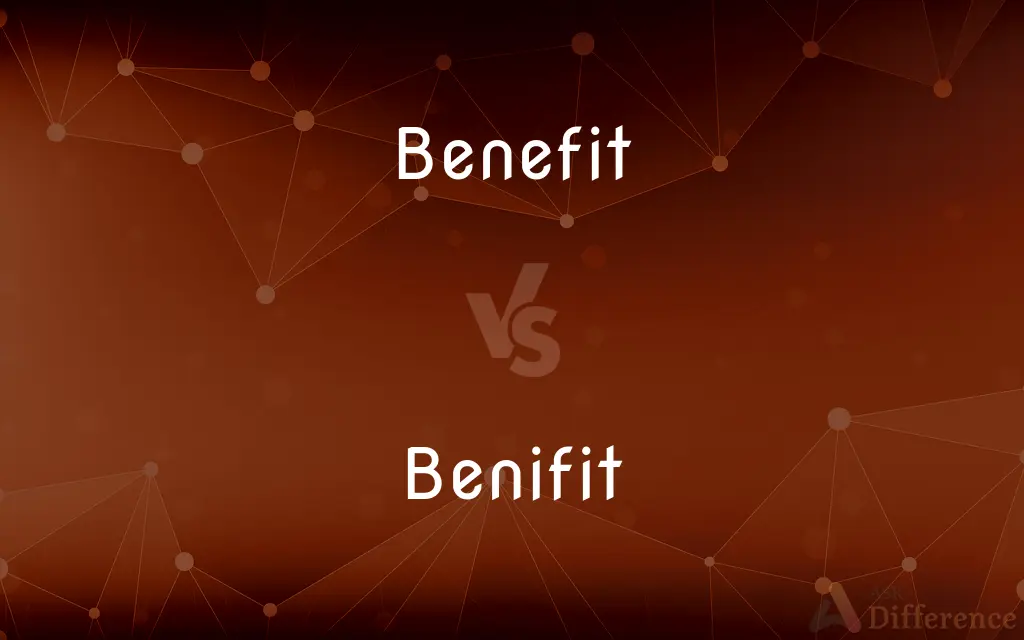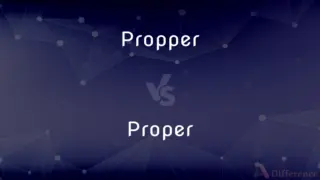Benefit vs. Benifit — Which is Correct Spelling?
By Tayyaba Rehman & Fiza Rafique — Updated on March 19, 2024
The correct spelling is "Benefit," and the incorrect version is "Benifit." Benefit refers to an advantage or gain received from something.

Table of Contents
Which is correct: Benefit or Benifit
How to spell Benefit?

Benefit
Correct Spelling

Benifit
Incorrect Spelling
ADVERTISEMENT
Key Differences
The word "fit" at the end indicates suitability or advantage, and it's spelled "fit," not "fiti."
Recall that "benefit" begins with "bene," which also starts words like "benevolent," indicating something good.
Associate it with "beneficial," which is clearly spelled with an "e."
"Benefit" has two E's, as in "Everyone Enjoys benefits."
How Do You Spell Benifit Correctly?
Incorrect: The health benifit of walking daily is well-documented.
Correct: The health benefit of walking daily is well-documented.
ADVERTISEMENT
Benefit Definitions
Benefit is an advantage or profit gained from something.
The benefit of exercise is improved health.
Benefit can refer to the positive impact on someone or something.
The new policy is of great benefit to employees.
Benefit can refer to a social event to raise funds for a cause.
They hosted a benefit concert for disaster relief.
Benefit denotes payments from the government to individuals in need.
He receives unemployment benefits.
Benefit can be used as a verb meaning to gain an advantage.
This strategy will benefit our company.
An advantage or profit gained from something
Enjoy the benefits of being a member
The changes are of benefit to commerce
A payment made by the state or an insurance scheme to someone entitled to receive it
Part-time jobs supplemented by means-tested benefits
Families on benefit
An event such as a concert or game that is intended to raise money for a particular player or charity
A benefit gig
The social season was highlighted by debutante balls and charity benefits
Receive an advantage; profit
The areas would benefit from regeneration
Something that promotes or enhances well-being; an advantage
The nurse explained the benefits of regular exercise.
Help; aid
The field trip was of great benefit to the students.
A payment made by a government agency or insurance company to qualifying persons in time of need
An increase in welfare benefits.
A form of compensation, such as paid vacation time, subsidized health insurance, or a pension, provided to employees in addition to wages or salary as part of an employment arrangement. Also called fringe benefit.
A public entertainment, performance, or social event held to raise funds for a person or cause.
(Archaic) A kindly deed.
To be helpful or useful to.
To derive benefit
You will benefit from her good example.
An advantage; help or aid from something.
She can't read, so the voice recording was made for her benefit.
Exposure to cutting-edge technologies is one of the benefits of the job.
(insurance) A payment made in accordance with an insurance policy or a public assistance scheme.
An event, such as a theatrical performance, given to raise funds for some cause.
(obsolete) beneficence; liberality
Intended audience (as for the benefit of).
The whole scene was staged for his benefit, and it completely fooled him.
Since my wife is Canadian, whenever we have dinner with my family, they keep bringing up anything they've heard about Canada lately for her benefit.
(transitive) To be or to provide a benefit to.
(intransitive) To receive a benefit (from); to be a beneficiary.
An act of kindness; a favor conferred.
Bless the Lord, O my soul, and forget not all his benefits.
Whatever promotes prosperity and personal happiness, or adds value to property; advantage; profit.
Men have no right to what is not for their benefit.
A theatrical performance, a concert, or the like, the proceeds of which do not go to the lessee of the theater or to the company, but to some individual actor, or to some charitable use.
Beneficence; liberality.
Natural advantages; endowments; accomplishments.
To be beneficial to; to do good to; to advantage; to advance in health or prosperity; to be useful to; to profit.
I will repent of the good, wherewith I said I would benefit them.
To gain advantage; to make improvement; to profit; as, he will benefit by the change.
Financial assistance in time of need
Something that aids or promotes well-being;
For the common good
A performance to raise money for a charitable cause
Derive a benefit from;
She profited from his vast experience
Be beneficial for;
This will do you good
Benefit Meaning in a Sentence
The benefit concert raised money for charity.
Drinking water has the benefit of keeping you hydrated.
Students can benefit from using the library for research.
The benefit of teamwork is achieving goals more efficiently.
One benefit of early planning is less stress.
Traveling can benefit your understanding of different cultures.
Technology can benefit education in many ways.
Regular check-ups have the benefit of early disease detection.
Volunteering has the benefit of making you feel part of a community.
Benefit Idioms & Phrases
To benefit greatly
To receive a lot of advantages from something.
She benefited greatly from her study abroad experience.
For the benefit of
Done for the advantage or good of someone or something.
The decision was made for the benefit of the community.
Benefit of the bargain
The advantage gained from something, especially a deal or agreement.
He definitely got the benefit of the bargain when he bought that car at such a low price.
Give someone the benefit of the doubt
To believe someone's statement, without proof, despite having reasons to doubt it.
I'll give you the benefit of the doubt, but please don't let me down.
To the benefit of
Resulting in good for someone or something.
The new laws were changed to the benefit of small business owners.
Mutual benefit
A situation where both sides gain advantages.
The partnership was formed for mutual benefit.
At someone's benefit
For someone's good or to help someone.
The charity event was held at the benefit of the local hospital.
Without benefit of
Lacking the advantages of something usually considered necessary.
They got married without benefit of a formal ceremony.
With the benefit of hindsight
Understanding of a past event based on knowledge gained later.
With the benefit of hindsight, we would have made a different decision.
Benefit by/through
To gain advantages by means of something.
Many students benefit through hands-on learning experiences.
Have the benefit of
To have the advantage of something.
We had the benefit of good weather for our outdoor event.
Benefit concert/performance
A concert or performance held to raise money for a cause.
The band played a benefit concert for disaster relief.
Under the benefit of
Protected or aided by something.
They operated under the benefit of a government grant.
Direct benefit
An advantage received directly from a specific action or source.
The community saw direct benefits from the new health clinic.
Benefit package
A collection of benefits provided by an employer.
The company offers an attractive benefit package to attract top talent.
To take benefit of
To use something to gain an advantage.
She took benefit of the free courses offered by the library.
Benefit from
To receive an advantage as a result of something.
You can benefit from setting clear goals.
Benefit in kind
A benefit that is given in the form of goods or services, not money.
Employees may receive benefits in kind, such as a company car.
Common Curiosities
What is the root word of Benefit?
Latin "bene facere."
Why is it called Benefit?
Derived from Latin "bene" (well) and "facere" (to do), indicating doing well or good.
What is the pronunciation of Benefit?
/ˈbɛn.ə.fɪt/
Which vowel is used before Benefit?
"A," as in "a benefit."
What is the plural form of Benefit?
Benefits.
Is Benefit an adverb?
No.
What is the verb form of Benefit?
Benefit.
Which conjunction is used with Benefit?
"And," as in "health and benefits."
Is Benefit an abstract noun?
Yes, when referring to an advantage or gain.
Which article is used with Benefit?
"A" or "the."
What is the singular form of Benefit?
Benefit.
Is Benefit a noun or adjective?
Both, primarily a noun but can be an adjective in contexts like "benefit concert."
Is Benefit a countable noun?
Yes.
How many syllables are in Benefit?
Two syllables.
What is the opposite of Benefit?
Drawback.
What is the first form of Benefit?
Benefit (as a verb).
Which preposition is used with Benefit?
"Of," as in "benefit of exercise."
Is the Benefit term a metaphor?
Can be used metaphorically.
Is the word Benefit imperative?
No.
Is the word Benefit a gerund?
No.
Is the word “Benefit” a Direct object or an Indirect object?
It can be either, depending on the sentence.
What is a stressed syllable in Benefit?
The first syllable, "Ben."
Which determiner is used with Benefit?
"A" or "the."
Is Benefit a vowel or consonant?
It's a word, not a vowel or consonant.
What part of speech is Benefit?
Noun or verb.
Is Benefit a collective noun?
No.
How do we divide Benefit into syllables?
Ben-e-fit.
What is another term for Benefit?
Advantage.
What is the third form of Benefit?
Benefited or benefitted (both are acceptable).
Is Benefit a negative or positive word?
Generally positive.
What is the second form of Benefit?
Benefited or benefitted (both are acceptable).
How is Benefit used in a sentence?
"The benefit of eating vegetables is well-documented."
Share Your Discovery

Previous Comparison
Propper vs. Proper
Next Comparison
Controling vs. ControllingAuthor Spotlight
Written by
Tayyaba RehmanTayyaba Rehman is a distinguished writer, currently serving as a primary contributor to askdifference.com. As a researcher in semantics and etymology, Tayyaba's passion for the complexity of languages and their distinctions has found a perfect home on the platform. Tayyaba delves into the intricacies of language, distinguishing between commonly confused words and phrases, thereby providing clarity for readers worldwide.
Co-written by
Fiza RafiqueFiza Rafique is a skilled content writer at AskDifference.com, where she meticulously refines and enhances written pieces. Drawing from her vast editorial expertise, Fiza ensures clarity, accuracy, and precision in every article. Passionate about language, she continually seeks to elevate the quality of content for readers worldwide.














































